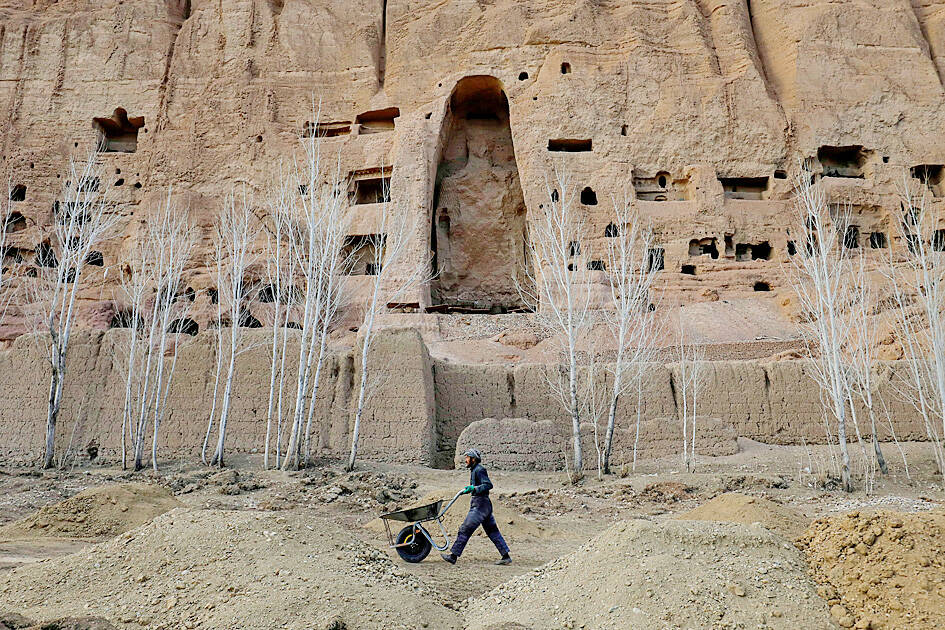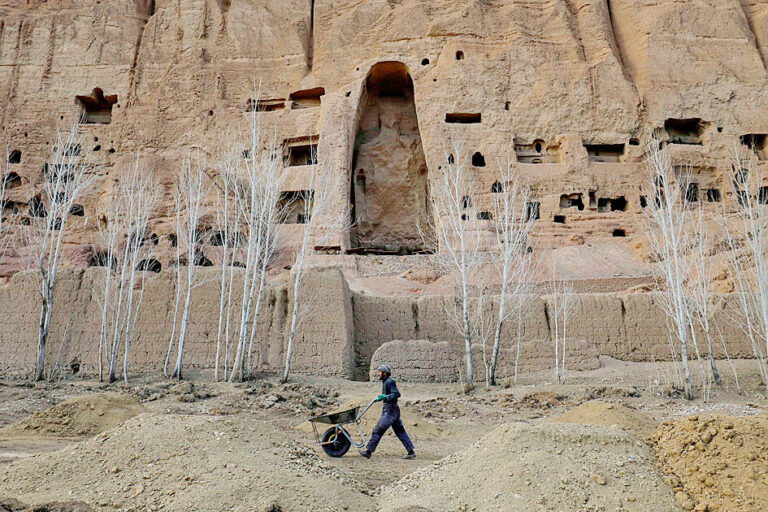Pascal Trouillot/AFP, Kabul
The attack, which killed foreign tourists visiting a market in central Afghanistan and was claimed by the Islamic State (IS), is also dealing a blow to the country’s budding tourism industry.
“New attacks in the coming weeks or months would be the end of tourism in Afghanistan,” said Joe Shaffer, founder of Safarat Tourist Agency, which specializes in tours to the country.
Last Friday, one or more militants killed six people, including three Spanish tourists, in the central province of Bamiyan. Four foreigners in the tourist group were wounded. IS claimed responsibility for an attack last Sunday on a group of 13 tourists at a Spanish travel agency, believed to be the first attack on foreign tourists since the Taliban returned to power in 2021.

Photo: Reuters
Taliban officials have touted improvements in security in Afghanistan since they seized power in 2021, ending an insurgency against foreign-backed government forces.
Bamiyan province is one of the country’s top tourist destinations, home to the Great Buddha statues, which were blown up in 2001 under the Taliban, and the turquoise lake of Band-e-Amir.
Schaefer said several customers have already canceled trips and the company is reviewing its operations in Afghanistan.
“Reduce group sizes. Cancel trips to remote areas. Reduce walking in public places,” he said.
“Of course any violent attack on tourists will have a negative impact on future tourist interest,” said James Wilcox, founder of travel agency Untamed Border.
But, he added, “We’ve been operating in Afghanistan for over 15 years and there has never been a period when there weren’t insurgent groups active in the country. Unfortunately, anyone visiting Afghanistan must take that into consideration when traveling.”
In Bangkok, Pakapong Tanthadakul, a travel agency manager for Away Vacations, wanted to cancel trips planned for next month and in July. The group from Buddhist-majority Thailand had wanted to visit Bamiyan, once a centre of Buddhist influence.
“Safety comes first, so I’ll check with my group first. If something happens, I can’t handle it,” she said.
Noor Mohammad Ramazan, founder of travel agency Let’s Be Friends Afghanistan (LBFA), said after the attack he had been “inundated with questions from clients concerned about their safety.”
“The crowded places and interaction with locals are what tourists like most about Afghanistan, but unfortunately we have to get away from that for a while,” he said.
But Ramazan said he doesn’t think the attack will kill tourism entirely.
“Afghanistan has had many problems in the past, but adventurous travelers still want to visit,” said Ramazan, who founded LBFA in 2015.
Didier Goudin, a French tourist who visited Bamiyan for the second year in a row two months ago on a skiing holiday, said he would be hesitant to return now.
“I knew there was a risk of terrorism in Afghanistan, but the risk seemed lower in a peaceful, welcoming area like Bamiyan,” Goudant said.
The Taliban regime is keen to encourage tourism, but many Western governments have repeatedly warned against visiting Afghanistan. Despite its underdeveloped infrastructure, the country’s beautiful scenery and the legendary hospitality of its people have attracted a growing number of adventurers over the past few decades. Since the Taliban ousted the Western-backed government, tourists have started to trickle in, with official figures showing a 120 percent increase in visitor numbers last year to about 5,200.
“The problem in Afghanistan is that tourism has gone from zero to 7,000 a year, even 10,000 in some cases,” Schaefer said.
“It was all too much, too fast,” he added.
“A lot of tour operators started out very slowly, very cautiously and with a lot of safety techniques. A lot of those precautions have been left behind because they’re busy putting out fires in terms of building infrastructure and building transportation,” he said.
Schaefer predicted that the Taliban regime, which arrested seven suspects after the attack, would respond by imposing further rules on tourists, who are already required to register in every province they visit.
“It’s just going to make it more difficult for foreign tourists to enjoy the country,” Schaefer said.
But he added that “it does absolutely nothing to prevent attacks from happening again.”
Comments are moderated. Please keep your comments relevant to the article. Comments containing insults, obscene language, personal attacks of any kind or promotion will be deleted and users will be banned. The final decision is at the discretion of Taipei Times.

